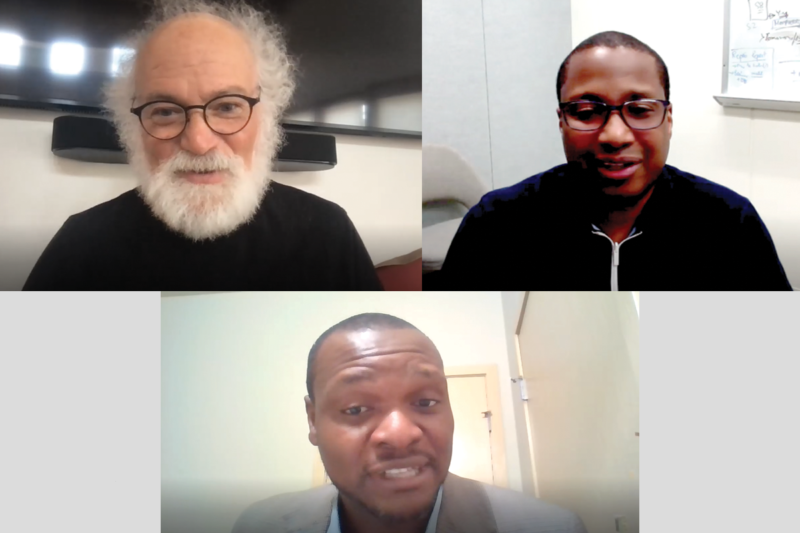MSRP Industry Night: Career Exploration with IBM
Authors
Authors
- Stephanie Schorow
MSRP Industry Night: Career Exploration with IBM

Authors
- Stephanie Schorow
Published on
07/13/2021
Career success requires curiosity, openness and occasional “goofing off” say IBM industry experts.
With advice that ranged from practicing “technical generosity,” to acknowledging failure, to making time to goof off, three IBM professionals urged students in the 36th MIT Summer Research Program (MSRP) to hold tight to both their sense of curiosity and fun when they transition out of academic life.
The three made their case for perpetual inquisitiveness during a July 13, 2021, virtual panel on “Industry Night: Career Exploration with IBM” for MSRP, a program for non-MIT undergraduates that aims to increase the number of underrepresented minorities and underserved students in the research enterprise.
“The first couple years in industry, don’t get yourself too bogged down into (one area) unless that’s what you really love,” said John Cohn, chief scientist at the MIT-IBM Watson AI Lab. After earning a BSEE in 1981 from MIT, Cohn joined IBM, moved to Vermont and spent the next 40 years on a plethora of projects that have produced more than 100 patents. “I think one of the great things about being out in the world is that you can try a bunch of things and figure out what you like. Equally important, you can figure out what you don’t like,” he said.
Joining Cohn on the panel were Daby M. Sow, a distinguished research staff member at the IBM Thomas J. Watson Research Center, and Ayorinde Hassan, an IBM intellectual property business development executive. Sparked by questions from students, the trio had a wide-ranging and often light-hearted discussion of post-graduation life:
“Is there life after grad school? I’m still trying to figure that out,” joked Cohn, who punctuated his call for continued “misbehaving and mischief” by donning a pair of glasses that lit up like a flashing news banner.
Some of their advice would be familiar to any graduate, but the trio added their own twists. For example, all emphasized networking. However, “the way you build your network is not by exchanging business cards,” said Sow, who joined IBM Research in October 2000 as a research scientist. “The way you build your network is you just do something good for people and don’t expect anything in return. You’ll be amazed how the network is going to support you when you’re going to need it.”
Or: Be receptive to new ideas. “If you’re a technical person, be open to learning about the business side of things,” said Hassan, who has a master’s in marketing as well as dual undergraduate degrees in chemistry and biology.
All three stressed what Cohn called “technical generosity.” Share information and work collaboratively. “Giving somebody help always paid off,” Cohn said. Likewise, “Asking for help, or taking somebody’s help is not a sign of weakness, it’s a sign of intelligence.”
Hassen spoke of the importance of effective communication. “It’s paramount that you are able to explain your science in such a way that an 11 year old could understand it, because it’s a measure of how much of the science that you know. If you cannot explain (your idea) in simple terms, you probably don’t fully understand your area.”
The panelists were asked several times if the business world would accommodate the kind of research and exploration found in academia. The answer was always yes. “We have a very strong academic presence; we go to conferences and write papers,” Sow said. “That’s an integral part of our job.”
“It’s a different trade off,” Cohn said. “I still think that my undergraduate years at MIT were the most intellectually demanding and stimulating. But I love having the grounding of an industry. We take real client problems, even though we may be working on something two or three or four years out on the horizon. We are still grounded in reality and that’s what really worked for me.”
Cohn spoke of his missteps as well as achievements. He described how he made a huge mathematical mistake while working on the issue of technical migration. His formula was written on a white board and he and a colleague both realized it wasn’t right. But they didn’t erase it. “We started looking at it and what came out of that was actually the heart of something we called minimum perturbation compaction and that ended up saving the company $350 million.”
The panelists also touched on current hot fields, such as hybrid cloud computing and AI security. Sow led IBM’s efforts to apply stream computing technologies to problems in critical care; he was the technical lead of the IBM Data Baby project that introduced streaming analytics to critical care systems. “Imagine the ability to suck every single data point coming out of those devices and provide some situational awareness to the doctors, so that they know exactly what’s going on with the patient,” Sow said.
“In the end we have one overarching common thread, which is that we do work that matters for the society,” he said.
The MIT IBM Watson AI Lab sponsored 10 MSRP students for summer 2021.
